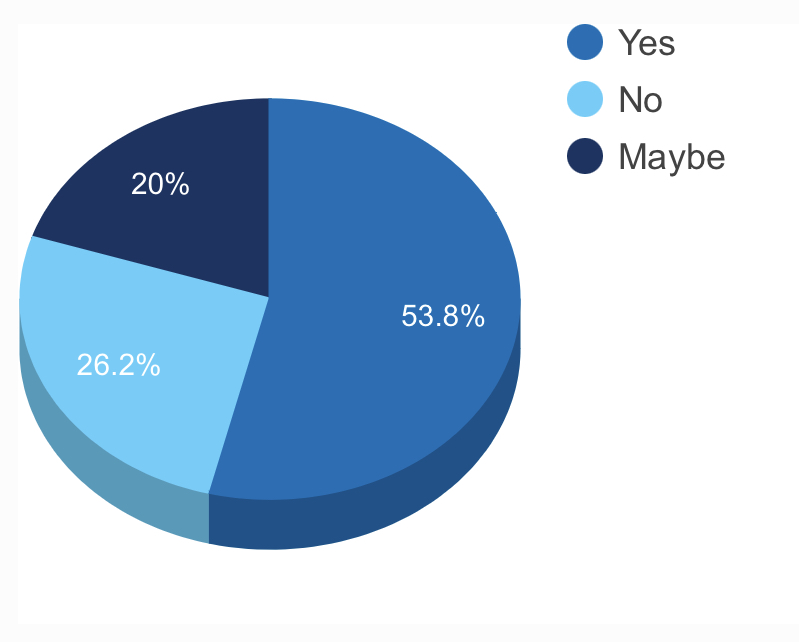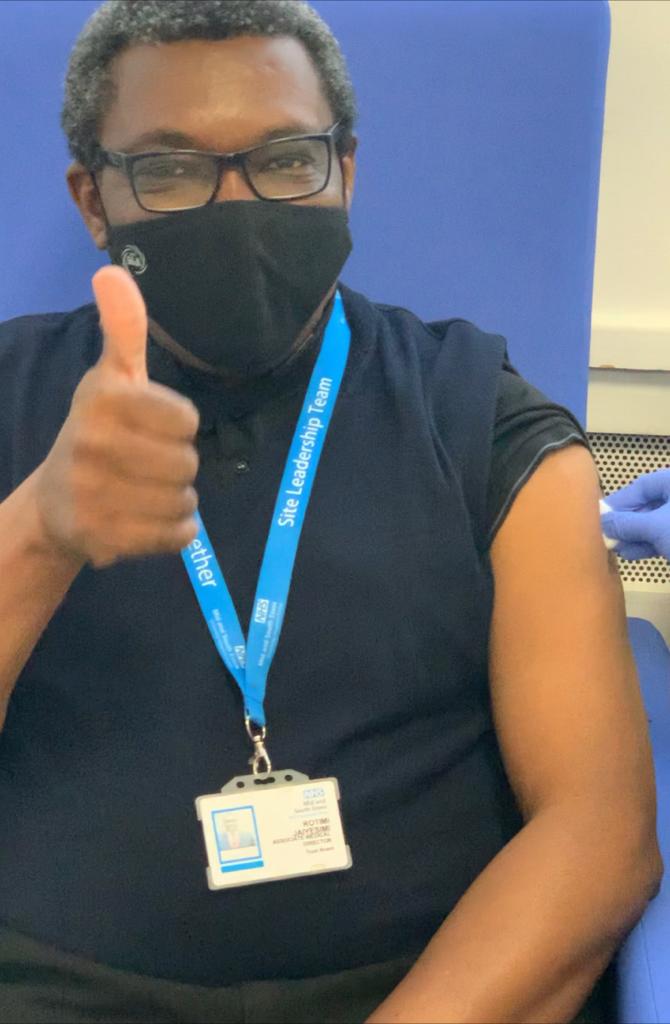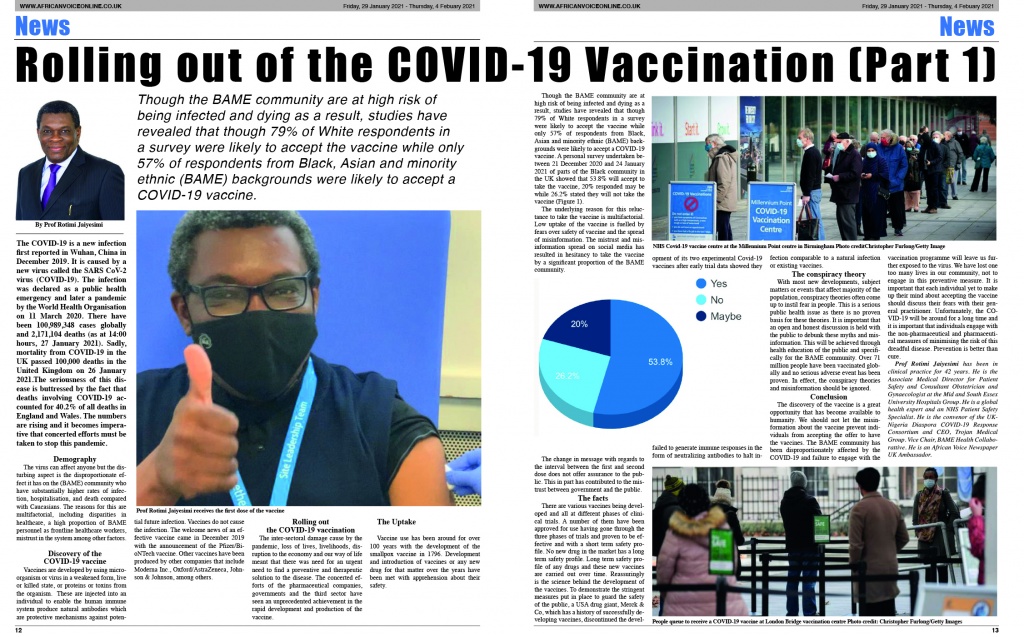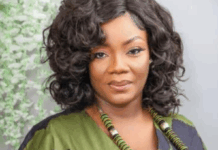Though the BAME community are at high risk of being infected and dying as a result of Covid-19, studies have revealed that though 79% of White respondents in a survey were likely to accept the vaccine while only 57% of respondents from Black, Asian and minority ethnic (BAME) backgrounds were likely to accept a COVID-19 vaccine.

Photo credit: Christopher Furlong/Getty Image
By Prof Rotimi Jaiyesimi – The COVID-19 is a new infection first reported in Wuhan, China in December 2019. It is caused by a new virus called the SARS CoV-2 virus (COVID-19). The infection was declared as a public health emergency and later a pandemic by the World Health Organisation on 11 March 2020. There have been 100,989,348 cases globally and 2,171,104 deaths (as at 14:00 hours, 27 January 2021). Sadly, mortality from COVID-19 in the UK passed 100,000 deaths in the United Kingdom on 26 January 2021.
The seriousness of this disease is buttressed by the fact that deaths involving COVID-19 accounted for 40.2% of all deaths in England and Wales. The numbers are rising and it becomes imperative that concerted efforts must be taken to stop this pandemic.
Demography
The virus can affect anyone but the disturbing aspect is the disproportionate effect it has on the (BAME) community who have substantially higher rates of infection, hospitalisation, and death compared with Caucasians. The reasons for this are multifactorial, including disparities in healthcare, a high proportion of BAME personnel as frontline healthcare workers, mistrust in the system among other factors.
Discovery of the COVID-19 vaccine
Vaccines are developed by using microorganism or virus in a weakened form, live or killed state, or proteins or toxins from the organism. These are injected into an individual to enable the human immune system produce natural antibodies which are protective mechanisms against potential future infection. Vaccines do not cause the infection. The welcome news of an effective vaccine came in December 2019 with the announcement of the Pfizer/BioNTech vaccine. Other vaccines have been produced by other companies that include Moderna Inc., Oxford/AstraZeneca, Johnson & Johnson, among others.
Rolling out the COVID-19 vaccination
The inter-sectoral damage cause by the pandemic, loss of lives, livelihoods, disruption to the economy and our way of life meant that there was need for an urgent need to find a preventive and therapeutic solution to the disease. The concerted efforts of the pharmaceutical companies, governments and the third sector have seen an unprecedented achievement in the rapid development and production of the vaccine.
The Uptake
Vaccine use has been around for over 100 years with the development of the smallpox vaccine in 1796. Development and introduction of vaccines or any new drug for that matter over the years have been met with apprehension about their safety. Though the BAME community are at high risk of being infected and dying as a result, studies have revealed that though 79% of White respondents in a survey were likely to accept the vaccine while only 57% of respondents from Black, Asian and minority ethnic (BAME) backgrounds were likely to accept a COVID-19 vaccine. A personal survey undertaken between 21 December 2020 and 24 January 2021 of parts of the Black community in the UK showed that 53.8% will accept to take the vaccine, 20% responded may be while 26.2% stated they will not take the vaccine (Figure 1).

The underlying reason for this reluctance to take the vaccine is multifactorial. Low uptake of the vaccine is fuelled by fears over safety of vaccine and the spread of misinformation. The mistrust and misinformation spread on social media has resulted in hesitancy to take the vaccine by a significant proportion of the BAME community. The change in message with regards to the interval between the first and second dose does not offer assurance to the public. This in part has contributed to the mistrust between government and the public.
The facts
There are various vaccines being developed and all at different phases of clinical trials. A number of them have been approved for use having gone through the three phases of trials and proven to be effective and with a short term safety profile. No new drug in the market has a long term safety profile. Long term safety profile of any drugs and these new vaccines are carried out over time. Reassuringly is the science behind the development of the vaccines. To demonstrate the stringent measures put in place to guard the safety of the public, a USA drug giant, Merck & Co, which has a history of successfully developing vaccines, discontinued the development of its two experimental Covid-19 vaccines after early trial data showed they failed to generate immune responses in the form of neutralizing antibodies to halt infection comparable to a natural infection or existing vaccines.

The conspiracy theory
With most new developments, subject matters or events that affect majority of the population, conspiracy theories often come up to instil fear in people. This is a serious public health issue as there is no proven basis for these theories. It is important that an open and honest discussion is held with the public to debunk these myths and misinformation. This will be achieved through health education of the public and specifically for the BAME community. Over 71 million people have been vaccinated globally and no serious adverse event has been proven. In effect, the conspiracy theories and misinformation should be ignored.
Conclusion
The discovery of the vaccine is a great opportunity that has become available to humanity. We should not let the misinformation about the vaccine prevent individuals from accepting the offer to have the vaccines. The BAME community has been disproportionately affected by the COVID-19 and failure to engage with the vaccination programme will leave us further exposed to the virus. We have lost one too many lives in our community, not to engage in this preventive measure. It is important that each individual yet to make up their mind about accepting the vaccine should discuss their fears with their general practitioner. Unfortunately, the COVID-19 will be around for a long time and it is important that individuals engage with the non-pharmaceutical and pharmaceutical measures of minimising the risk of this dreadful disease. Prevention is better than cure.
Watch procedure on https://bit.ly/3hJOKW8
Prof Rotimi Jaiyesimi has been in clinical practice for 42 years. He is the Associate Medical Director for Patient Safety and Consultant Obstetrician and Gynaecologist at the Mid and South Essex University Hospitals Group. He is a global health expert and an NHS Patient Safety Specialist. He is the convenor of the UK-Nigeria Diaspora COVID-19 Response Consortium and CEO, Trojan Medical Group. Vice Chair, BAME Health Collaborattive. He is an African Voice Newspaper UK Ambassador.
Kindly follow us on twitter:@AfricanVoice2












